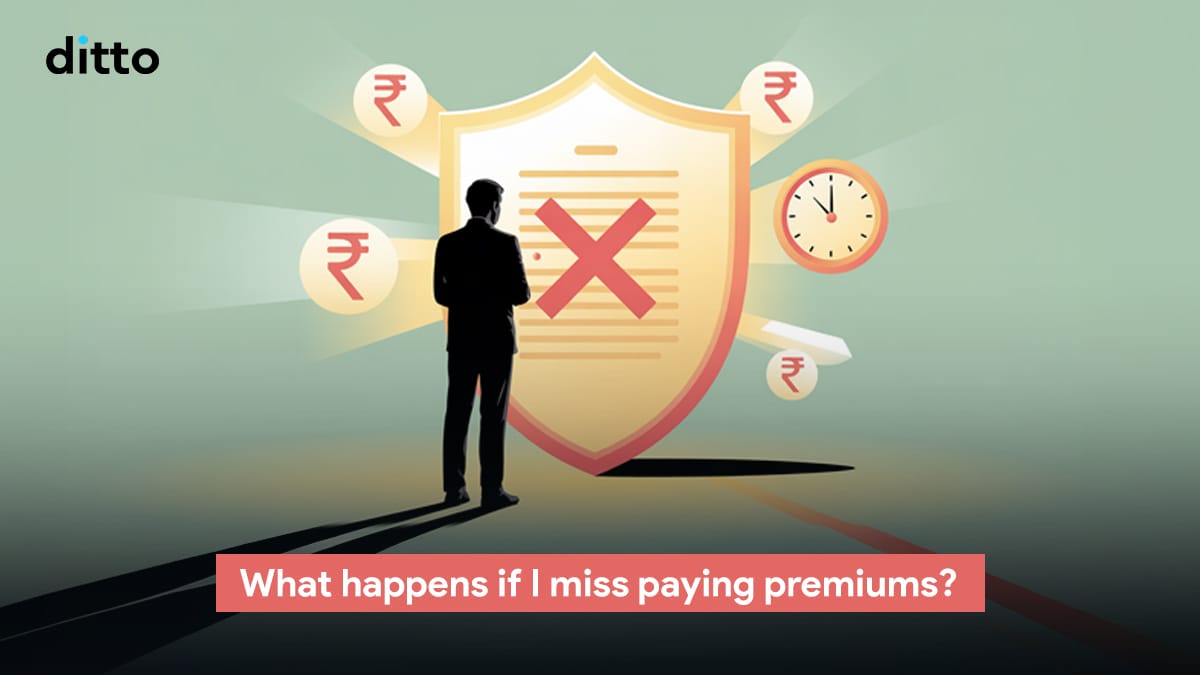| Missing Premiums: How It Affects Your Term Life and Health Insurance Coverage? If you miss a premium payment, most insurance policies provide a grace period, typically 15 to 30 days, during which you can pay without losing coverage. 1) Term Life Insurance: If you pay within the grace period, your policy remains active. If the payment isn’t made by the end of the grace period, the policy pauses (instead of ending completely), and coverage can usually be revived once the missed premium is paid, sometimes with interest or late fees. 2) Health Insurance: Health coverage usually comes with a grace period to make premium payments, though claims aren’t reimbursed during this time. If the premium remains unpaid after the grace period, the policy will lapse and cannot be revived. In such cases, a new policy would need to be purchased to continue coverage. |
Many people diligently pay their insurance premiums, but aren’t always aware of the impact of missing even a single payment. This lack of clarity can lead to unexpected lapses in coverage, denied claims, or higher costs to reinstate the policy.
At Ditto, our advisors review numerous insurance cases every month and have seen firsthand how understanding grace periods and revival options can save policyholders from unnecessary stress. For this guide, we analyzed insurer policies, IRDAI guidelines, and real-world scenarios to provide clear insights.
By the end of this article, you will understand:
- What happens if you miss paying premiums?
- The consequences of missing even the grace period
- Practical steps to take if you have missed an insurance premium payment
Friendly reminder: It’s easy to get lost comparing policies and premiums. Instead of spending hours on it, why not get personalized insurance advice from Ditto? We offer free consultations with zero spam! Just 30 minutes to clarify all your doubts. So book a call now.
What Happens If You Miss a Premium Payment?
Missing an insurance premium can happen to anyone; maybe you forgot the due date, faced a financial crunch, or had a delay in your bank auto-debit. The good news is that insurers usually give you a little extra time before things get serious.
The consequences of a lapse can be significant:
- Loss of coverage and benefits: You and your family won’t receive any protection if something happens during the lapsed period.
- Loss of accumulated value (if applicable): For policies like ULIPs or traditional savings plans, you could lose part or all of your policy’s value if it lapses early.
- Reapplication or higher reinstatement costs: Reapplication or higher reinstatement costs: To restore coverage, you may need to reapply, pay all pending premiums with interest, and submit new medical tests or reports. Any costs for these tests are usually not reimbursed, and your policy may come with higher premiums or stricter terms.
While insurers offer grace periods, missing payments repeatedly or letting your policy lapse can make maintaining long-term financial security harder and more expensive.
Setting up auto-debit for your premiums is the easiest way to avoid this. Net banking auto-debit is generally more reliable, as UPI and card payments can sometimes fail. Paying on time ensures your loved ones stay protected without interruption.
What if You Miss Even the Grace Period?
If you miss paying your premium even after the grace period, your policy will lapse or be terminated, depending on the insurer’s rules and the type of plan you hold. This means your life cover or health coverage will no longer be active, and you’ll lose all protection benefits until the policy is revived.
Once a policy lapses, coverage is suspended, which means that if something unfortunate happens during this period, the insurer will not honor any claims. However, this doesn’t always mean your policy is gone for good. Most life insurers provide a revival period, usually ranging from a few months to up to five years, during which you can restore your policy by fulfilling certain conditions.
To reinstate your lapsed policy, you’ll generally need to:
- Pay all overdue premiums along with any interest or penalties.
- Submit a declaration of good health or undergo medical tests, especially if a significant time has passed since the lapse.
- Wait for the insurer’s approval, as reinstatement is subject to their underwriting assessment.
Keep in mind that the longer your policy stays inactive, the harder (and more expensive) it may become to revive it. Insurers might revise your premium or impose stricter conditions based on updated health reports or age.
| Ditto Tip: Automate your premium payments through your bank or insurer to avoid lapses. If you prefer manual payments, use calendar reminders or alerts from apps like GPay, PhonePe, Cred, or Amazon Pay. You can also opt for WhatsApp, email, or SMS reminders from your insurer. These small steps help prevent policy revival hassles, avoid coverage gaps, and keep your family financially secure without stress. |
What Should You Do If You Have Missed Your Term Insurance Premium Payment?
Missing a term insurance premium can be stressful, but acting quickly can help you minimize the impact and restore your coverage.
Here are the steps you should take:
1.) Contact your insurer immediately:
As soon as you realize a payment has been missed, reach out to your insurer or your agent/intermediary, like Ditto. Inform them of the situation and ask about your available options. Early communication can prevent misunderstandings and help you learn about any flexible solutions or extensions specific to your policy.
2.) Check for revival periods:
Many insurance policies provide a revival window even after the grace period has ended. During this time, you may be able to reinstate your policy by paying the overdue premiums and meeting any additional requirements. Understanding your policy’s revival rules is key to avoiding a permanent lapse.
3.) Pay overdue premiums promptly:
The faster you pay the pending amount, the better. Prompt payment can prevent additional penalties, stop your policy from lapsing permanently, and ensure that your coverage continues without interruption.
4.) Consider a new policy if reinstatement isn’t possible:
If your policy doesn’t allow reinstatement, it’s important to weigh whether paying pending dues and penalties is worth it, or if buying a new term insurance policy makes more sense. This ensures your family stays protected without coverage gaps. Acting early can also help avoid higher premiums later due to age or changes in health.
What Should You Do If You Have Missed Your Health Insurance (Mediclaim) Premium Payment?
Missing a health insurance premium can have serious consequences, but knowing the rules around grace periods and continuity benefits can help you avoid lapses and loss of coverage. IRDAI’s 2024 guidelines have clarified how grace periods work, what benefits remain protected, and what happens if you miss the payment. Here’s a clear breakdown:
1.) Grace Period Availability:
Insurers must provide a 15-day grace period for monthly premiums and 30 days for quarterly, half-yearly, or annual premiums. This gives you extra time to make the payment without immediate loss of coverage.
2.) Coverage During Grace Period:
Your policy remains active during the grace period, protecting you in case of medical emergencies. Any unpaid premium is typically deducted from claims if a payout arises during this period.
3.) Benefits Preserved if Paid Within Grace:
Paying the overdue premium within this period ensures that all your continuity-linked benefits stay intact. Your sum insured remains unchanged, your No-Claim Bonus (NCB) is preserved, and your waiting-period credits for pre-existing diseases continue without interruption.
Even your moratorium period clock, the 60-month “no contest” rule that protects you from claim disputes, keeps running as usual. In short, if you clear the payment within the grace window, it’s almost as if you never missed it.
4.) What Happens If the Grace Period Ends Unpaid?
If you miss the payment even after the grace period, your policy lapses. Coverage stops, and you lose all continuity benefits, including NCB and waiting-period credits. Portability to another insurer may also be affected.
5.) Claims During Grace Period:
Claims are payable during the grace period, with unpaid premiums recoverable from the claim amount. Always check your policy wording for exact operational details.
6.) Next Steps If You’ve Missed a Payment:
If you’ve missed a premium payment, act quickly. If you’re still within the grace period, make the payment immediately to maintain uninterrupted coverage.
If the grace period has passed, reach out to your insurer to explore any late renewal options. If those aren’t available, you may need to purchase a new policy to ensure your health coverage continues without gaps.
Paying your health insurance premium on time, or within the grace period, ensures uninterrupted coverage and preserves all benefits, protecting your family from unexpected financial risks.
Why Talk to Ditto for Insurance?
At Ditto, we’ve assisted over 8,00,000 customers with choosing the right insurance policy. Why customers like Arun below love us:

✅No-Spam & No Salesmen
✅Rated 4.9/5 on Google Reviews by 15,000+ happy customers
✅Backed by Zerodha
✅Dedicated Claim Support Team
✅100% Free Consultation
Ditto’s Take on Missing Your Insurance Premium Payment
At Ditto, we know that life can get busy, and even the most responsible policyholders may occasionally miss a premium payment. While insurers offer grace periods and revival options, it’s crucial to take missed payments seriously, as any lapse can impact your coverage, claims, and long-term financial security.
We recommend taking prompt action if a payment is missed: reach out to your insurer, review your policy for grace periods and revival options, and clear any overdue premiums as soon as possible. Doing so minimizes disruption to your coverage and helps avoid extra costs, penalties, or re-underwriting.
If reinstatement isn’t possible, we suggest exploring new term insurance options without delay, ensuring your family remains protected and your financial plans stay on track.
At Ditto, we also have a dedicated team handling policy renewals for customers who have purchased policies through us. They provide reminders, address queries, assist with adding or removing members, help manage riders or add-ons, and support you with any other policy-related needs. By using tools like auto-pay, reminders, and calendar alerts, we make it easier to stay on top of premiums and prevent lapses, saving you from future stress and costs.
FAQs
Can I pay a part of my premium if I am in a financial crisis?
Most insurers require full payment to keep the policy active, and partial payments are usually not accepted. However, you can contact your insurer to explore support options, such as switching from a yearly to a monthly payment plan, which can make premiums more manageable during a financial crunch.
What happens if I pay within the grace period?
Your policy stays active, and no coverage is lost as long as the premium is paid within the grace period.
Can I revive my policy after it lapses?
Many life insurance policies allow a revival window where you can reinstate coverage by paying overdue premiums and possibly submitting medical evidence.
Will missing payments affect my future insurability?
Yes. Lapsed policies (life insurance) may require new underwriting, which could result in higher premiums or even denial of coverage.
Will missing payments affect my claims?
Yes. If a claim arises during a lapse, the insurer may not honor it. Coverage is only valid when premiums are paid and the policy is active, so timely payments are essential to ensure your claims are covered.
What if I temporarily cannot afford premiums?
Contact your insurer immediately to discuss options like premium holidays, deferments, or other financial assistance programs.
Last updated on:










